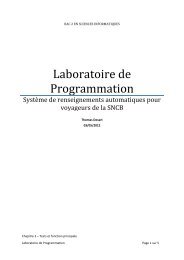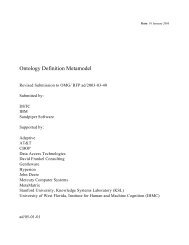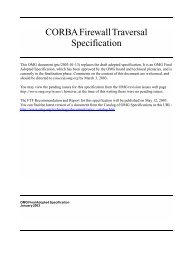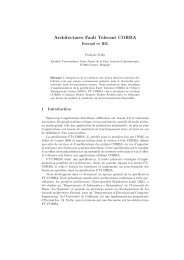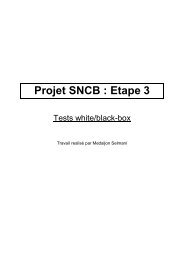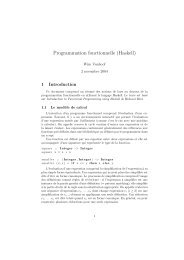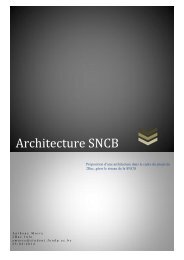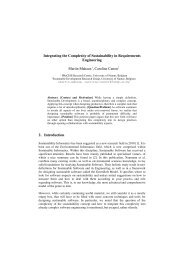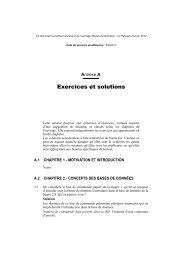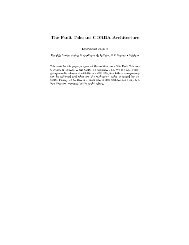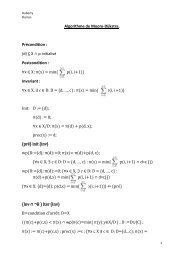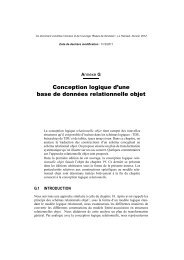Database Reverse Engineering - A Case Study - Institut d'Informatique
Database Reverse Engineering - A Case Study - Institut d'Informatique
Database Reverse Engineering - A Case Study - Institut d'Informatique
You also want an ePaper? Increase the reach of your titles
YUMPU automatically turns print PDFs into web optimized ePapers that Google loves.
- ORD-DETAIL.DETAILS.REF-DET-STK is a multivalued foreign key to STOCK. Here the REF part of<br />
the name suggests a referential function of the field.<br />
- CUS-HIST.PURCH.REF-PURCH-STK is a multivalued foreign key to STOCK<br />
Now the schema looks like that in Fig. 4.<br />
ORDER<br />
STOCK<br />
CUSTOMER<br />
ORD<br />
ORD-CODE<br />
ORD-CUSTOMER<br />
ORD-DETAIL<br />
DETAILS[20-20]<br />
REF-DET-STK<br />
ORD-QTY<br />
id: ORD-CODE<br />
acc<br />
ref: ORD-DETAIL.DETAILS[*].REF-DET-STK<br />
ref: ORD-CUSTOMER<br />
acc<br />
STK<br />
STK-CODE<br />
STK-NAME<br />
STK-LEVEL<br />
id: STK-CODE<br />
acc<br />
CUS<br />
CUS-CODE<br />
CUS-DESCR<br />
NAME<br />
ADDRESS<br />
FUNCTION<br />
REC-DATE<br />
CUS-HIST<br />
PURCH[100-100]<br />
REF-PURCH-STK<br />
TOT<br />
id: CUS-CODE<br />
acc<br />
ref: CUS-HIST.PURCH[*].REF-PURCH-STK<br />
Figure 4. The foreign keys are made explicit.<br />
4.2.3 Elicitation of identifiers of multivalued fields<br />
Compound multivalued fields in COBOL records often have an implicit identifier that makes their values<br />
unique. The schema includes two candidate multivalued fields : ORD-DETAIL.DETAILS and CUS-<br />
HIST.PURCH.<br />
By examining the way in which these fields are searched and managed, we isolate the following pattern (or<br />
program slice [Weiser,84] ):<br />
SET IND-DET TO 1.<br />
UPDATE-ORD-DETAIL.<br />
MOVE 1 TO NEXT-DET.<br />
...<br />
PERFORM UNTIL REF-DET-STK(NEXT-DET) = PROD-CODE OR IND-DET = NEXT-DET<br />
ADD 1 TO NEXT-DET<br />
END-PERFORM.<br />
IF IND-DET = NEXT-DET<br />
MOVE PROD-CODE TO REF-DET-STK(IND-DET)<br />
PERFORM UPDATE-CUS-HIST<br />
SET IND-DET UP BY 1<br />
ELSE<br />
DISPLAY "ERROR : ALREADY ORDERED".<br />
It derives from this code section that the LIST-DETAIL.DETAILS array will never include twice the same<br />
REF-DET-STK value. Therefore, this field is the local identifier of this array, and of ORD-<br />
DETAIL.DETAILS as well. Through the same reasoning, we are suggested that REF-PURCH-STK is the<br />
identifier of LIST-PURCHASE.PURCH array. These findings are shown in Fig. 5.<br />
FIIA96 (04/04/07) 6



